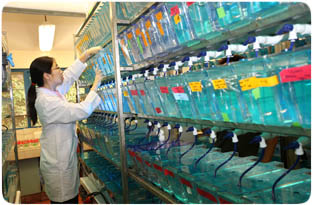
The Zebrafish facility in building S1 is fully equipped with AHAB systems for the ever increasing needs of research and teaching using zebrafish. There are six rooms with controlled water recirculation, temperature and photoperiod, and one microinjection room for teaching and research. A central RO water supply is automatically controlled and water quality is daily monitored. The facility can accommodate up to 600 tanks. Numerous strains and transgenic and mutant lines of zebrafish provide resources for undergraduate teaching and graduate experiments. Seven PIs make full use of this facility and resource in their teaching and research.
The medaka aquarium in building S2 is a newly renovated facility with customized MP medaka maintenance systems. The 24 fully re-circulating systems accommodate up to 960 tanks, and can hold various wild type strains, transgenic and mutant lines of medaka which provide resources for research projects, graduate experiments and undergraduate teaching classes of the department. Three research labs use this facility on a regular basis.
Fresh Water Aquarium facilities
The freshwater aquarium facility, located in building S3 can cater for the needs of intensive teaching and research activities in the department. It comprises a modern comfortable working space, and well-utilized area for housing a variety of freshwater species under controlled conditions. The resources include a recirculation water system, a range of different sized aquaria, bench space, storage cabinets, continuous air supply, a continuous flow of dechlorinated water and controlled photoperiod to facilitate the keeping and handling of live specimens. Goldfish, lung fish, African catfish and other fresh water aquatic animals are kept for use in research. Zebrafish and medaka are also housed here for use in undergraduate teaching laboratories and practical classes, and five research labs also use these facilities on a regular basis.
Marine facilities
A small seawater facility in the department holds aquariums which are used for the study of hatchery technology, feed development, spawning and rearing of marine fish. For larger running seawater aquariums, we have access to the facilities of the Tropical Marine Science Institute (TMSI) on St John’s island. These state-of-the-art laboratories were opened in 2001 to support research in marine science, environmental science and aquaculture and as such provide scientists with all the required marine habitats and aquaria. DBS enjoys close collaboration with TMSI, so extending the possibilities at NUS for multidisciplinary marine research.
